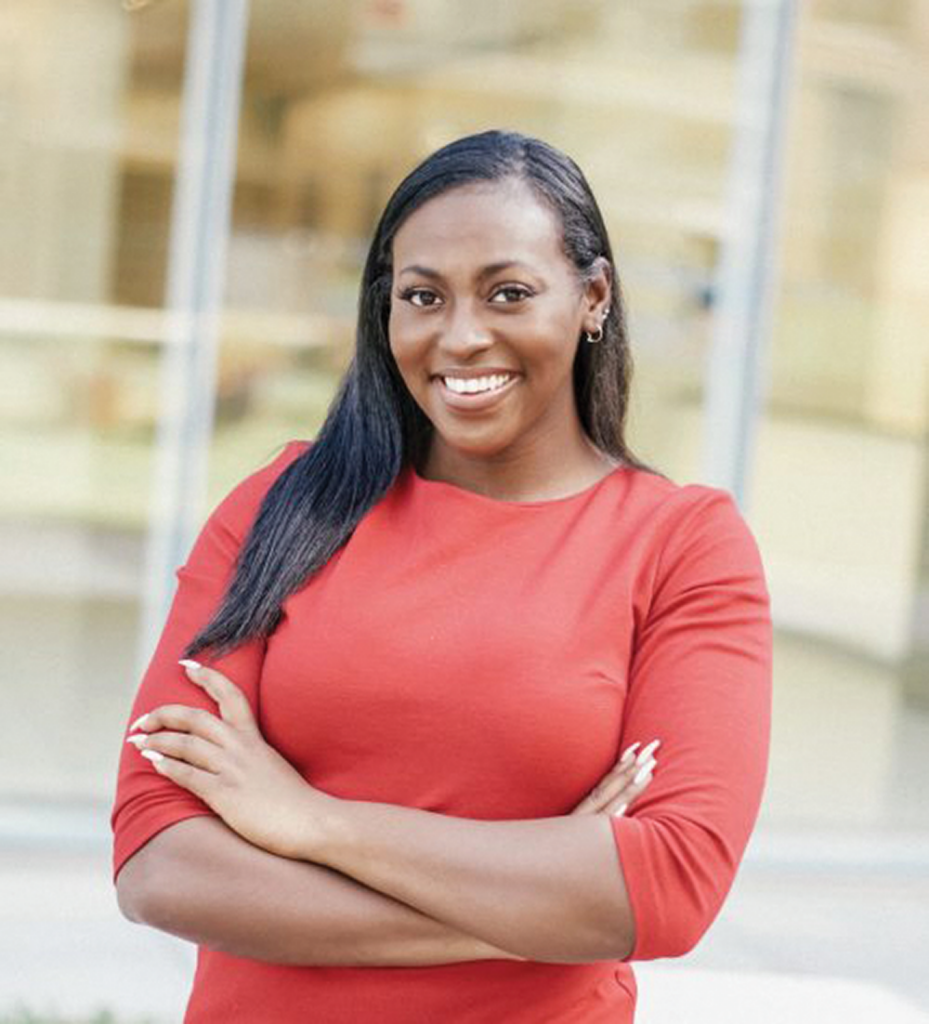Women hold the five highest-ranking positions in the newly elected board of Georgetown University Law Center’s student government, with Jade Baker (LAW ’22) becoming the first Black woman to serve as student body president.
The top leadership positions elected March 11 to the 2021-22 Executive Board of the Georgetown Student Bar Association, the student government at the Law Center, president, day vice president, evening vice president, treasurer and secretary consist of five women, three of whom identify as women of color. The board’s first priorities upon entering office are to ensure a safe, swift return to campus and to promote diversity, equity and inclusion within the Law Center, according to Baker, who formerly served as the day vice president during the 2020-21 academic year.

The new representatives will enter office with a commitment to strengthening the Law Center’s student government, according to Baker.
“I knew that I wanted to be a part of the SBA, and I wanted to help in any capacity that I could, but I didn’t necessarily think I would ever get elected to this role; I’m really proud to be a part of that,” Baker said in a phone interview with The Hoya. “I’m happy to be the first but not the last in that role, and I’m especially proud because my vice president is also a Black woman.”
The SBA’s main goal is to act as a conduit between the Law Center student body and the administration, with the board meeting bimonthly with the law school administration and relevant graduate programs to raise concerns about certain issues, such as grading, student funding and issues related to the COVID-19 pandemic, according to Olivia Hinerfeld (SFS ’17, LAW ’21), the outgoing president of the SBA.
The growing diversity of the Law Center student body is exhibited by the new members of this year’s board, according to William Treanor, dean of the Law Center.
“Importantly, the new board and delegate body are highly diverse, which reflects the increased diversity of our student body,” Treanor wrote in an email to The Hoya. “Over the last several years, we have welcomed our most diverse incoming classes ever. I look forward to continued partnership with our remarkable student leaders.”
Law students are condemning racism at the Law Center following the release of a recording in which professor Sandra Sellers made racist statements regarding the performance of Black students in a conversation with professor David Batson. The Law Center terminated Sellers on March 11, and Batson announced his resignation the following day. Several student organizations and affinity groups, including the Black Law Students Association, are calling for structural reform within the Law Center to include updates to the current grading system.
The board’s election brings attention to increased representation in the Law Center’s student government, according to Suzanne Dabage De La Espriella (LAW ’22), the reelected treasurer of SBA.
“I think it highlights the fact that the student body is changing and the fact that new voices are coming through, and I think that is extremely significant in its own right,” Dabage said in a phone interview with The Hoya. “I am so excited to see how they bring their voices to the table and are able to make hopefully some real, real change in the administration and in SBA generally, in how we interact with students and get students from all backgrounds represented.”
During protests in the summer of 2020 against the police killings of Black citizens, the SBA worked closely with the BLSA to develop a set of concrete proposals to affirm the Law Center’s commitment to racial justice, according to Hinerfeld. The three proposals included implementing a diversity requirement to the curriculum that is modeled after that of the main campus, faculty training on creating inclusive classroom environments and establishing the university’s Racial Justice Institute.
GULC is supported by various student-faculty committees consisting of one tenured faculty chair, faculty members, staff and SBA-elected student representatives that advise the dean’s office regarding specific topics of interest within the policies of the Law Center, such as admissions, the COVID-19 pandemic, finances and professional responsibility. The board intends to foster diversity, equity and inclusion at the Law Center by restructuring the student-faculty committees, according to McCall Wells (LAW ’23), who was elected as the day vice president, the vice presidential role that represents the law school’s day program.
“I will advocate for all student committee members to have a vote and for committees to appoint student co-chairs to increase students’ agenda-setting power,” Wells wrote in an email to The Hoya. “This way, students, many of whom possess concerns about D,E&I, will have a reliable venue to voice their concerns.”
The current structure of these bodies distributes unequal voting power between faculty and student representatives, according to Wells, who said that faculty members have a nearly uniform say on voting for policies, and the committees should instead empower students to voice their concerns over issues at the Law Center, such as discussion surrounding the Title IX sexual misconduct policy and hiring new faculty.
Another focus for the SBA will be to help transition the Law Center back to in-person operations, according to Hinerfeld.
“I think Jade and her team are excited to hit the ground running to help the Georgetown Law community have a safe return to campus hopefully in this next year and restore more of a sense of normalcy,” Hinerfeld said in a phone interview with The Hoya.
The Law Center community has demonstrated resilience and resourcefulness in joining together to overcome obstacles related to the COVID-19 pandemic, according to Wells.
“I’m confident that we as a community will be able to develop creative ways to transition safely back to campus while carrying forward the positive lessons we’ve learned through the pandemic, such as the importance of achieving work-life balance and providing unwavering support for one another,” Wells wrote.




















